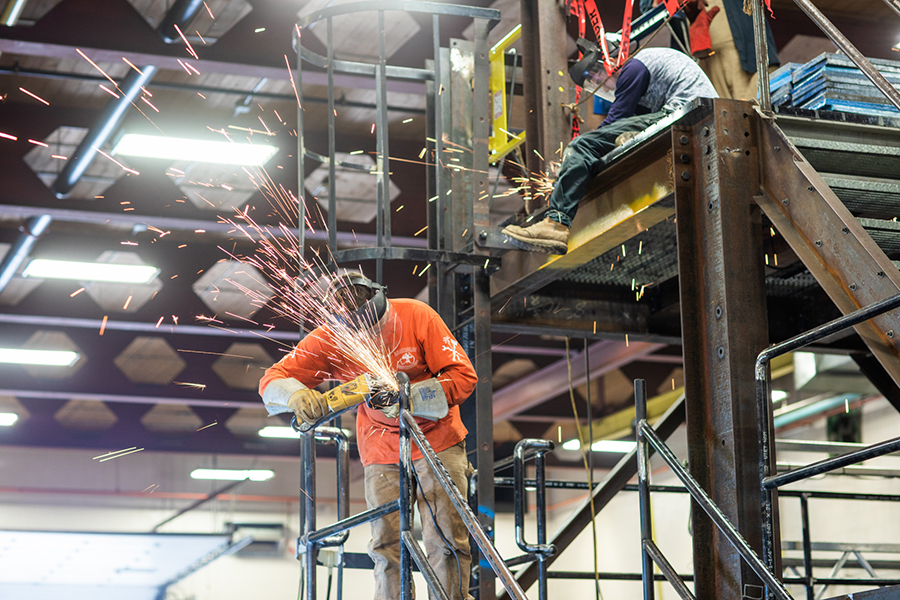“These changes will elevate and promote skilled trades in Alberta”
Trades and apprenticeship education is set to receive a major overhaul to improve outcomes for graduates and meet the needs of industry. In June, the provincial government proclaimed the new Skilled Trades and Apprenticeship Education Act – the first update to trades training legislation in Alberta in 30 years.
Matthew Lindberg (Plumber ’01, pictured below), dean of NAIT’s School of Skilled Trades, will play an integral role in shaping the future of trades education.
On June 30, he was appointed to the Alberta Board of Skilled Trades – a 15-member team with extensive experience in trades and apprenticeship training. The board will work to streamline apprenticeship education and also promote the recognition of its value province wide and across Canada, not unlike diplomas and degrees.
Lindberg’s appointment is a natural fit. He understands the system from multiple perspectives – and represents the province’s largest apprenticeship educator.
After taking his training at NAIT, Lindberg worked for a family-run plumbing company for more than a decade before returning as an instructor. He became dean of the School of Skilled Trades in May 2021. Lindberg is also a board member of the Skills Alberta Provincial Technical Committee, a member and educator representative of the Canadian Apprenticeship Forum, and a member of the Skills Canada National Technical Committee.
Techlifetoday spoke with Lindberg about his role on the new trades board, the improvements that lay ahead for apprenticeship training, and what those will mean for Albertans.
 Techlifetoday: Congratulations on being appointed to the Alberta Board of Skilled Trades. What does this mean to you?
Techlifetoday: Congratulations on being appointed to the Alberta Board of Skilled Trades. What does this mean to you?
Matt Lindberg: It's incredibly humbling and I’m honoured to be part of what I perceive as a pivotal moment in apprenticeship in the province. It’s exciting to have this opportunity to be part of the significant changes we're going to see in response to feedback that's been provided for decades.
Why are these changes happening now and what can we expect to see from them?
The previous act was very prescriptive and required even minimal changes to go through the legislative process to be adopted as new practice. This made any changes to apprenticeship education, particularly around updating course outlines and curriculums, extremely slow.
The new act is not nearly as prescriptive. Legislation won't be required to make changes to apprenticeship education going forward.
As for those changes, we're going to see more post-secondary involvement with the creation of curriculum and course outlines. This will bring the apprenticeship course outlines and curriculums in line with their diploma and certificate counterparts, where we have a constant review and renewal process to make sure that the material we deliver is meeting industry needs and staying current and relevant with the pace of technology.
Overall, the new act promises to help streamline the ability to respond and react to course outline changes, incorporating feedback from industry, apprentices and the post-secondary institutes that deliver the education.

How will the work of this board improve skilled trades and apprenticeship training in Alberta and, in turn, benefit industry and the province?
I think that because we have the ability to make changes with the removal of some of the red tape that we've had in place, we're going to be able to support industry by helping to close the skills gap and meeting the needs of their labour force.
We know that there's a lot of shortages in skilled labour in many sectors across the province and I feel that these changes will elevate and promote skilled trades in Alberta, which will ultimately help support industry in closing that skilled labour gap.
How will your involvement on this board benefit NAIT and students?
We’ll be able to share experiences from both an institute and a student perspective, as well as some of the frustrations that we've had with processes and policies. We’ll also be able to share the experiences and frustrations with past practices from the industry stakeholders that we have at that table, using all feedback to develop processes and policies that are going to support students, student progression and industry stakeholders.
"This new act will help us continue to serve the needs of thousands of apprentices in this province."
Curriculum and course outline changes that will come out of the new act will be created with the mindset around making sure student progression isn’t negatively impacted.
NAIT is the largest apprenticeship education provider in the province and has been for a long time. Our commitment to this is exceedingly strong. That focus has never been lost and this new act will help us continue this work and continue to serve the needs of thousands of apprentices in this province.

When does this work begin?
The board stands up on July 20. There are going to be meetings starting on the 21st and throughout the summer. Because we know that this act will be so impactful to apprenticeship, we really want to make sure that we're prioritizing those conversations. There's a ton of work that needs to happen and a lot of engagement that needs to take place, so we’re hitting the ground running.
Lastly, how do you hope the new act will change skilled trades and apprenticeship education for the better?
I’m hopeful that the changes made to course outlines and curriculums will not only reflect what's happening in industry currently, but will also take into consideration what's going to be the best practice in two, three and five years from now. This will help identify what skill sets will we need to incorporate to support graduates with new and emerging technology.
Hopefully, we're going to be able to see impact as early as the 2023-24 academic year.
I also really hope the impact of skilled tradespeople will be felt across the province by highlighting the integral contributions that journeypeople make to this province’s economy. The skills apprentices acquire through their education not only support them through their careers, allowing them to positively impact their trade, but allow them to grow in many ways.
If you look at many of the members on the Alberta Board of Skilled Trades as an example, it's encouraging to see their career progression, which started off in the trades before they moved on to other positions and opportunities.
These opportunities were created for them because of their experiences, the skills and knowledge they gained as they became journeypersons, and they were able to use those skills as they progressed in their careers, allowing them to positively contribute to their trades and opening doors for other opportunities ithin their respective industries and beyond.

Alberta Board of Skilled Trades members from the NAIT community
The Alberta Board of Skilled Trades comprises 15 individuals who have made an impact on skilled trades and apprentices throughout their careers. In addition Matt Lindberg, grad and dean of the School of Skilled Trades, a number of them are members of NAIT’s alumni community, including